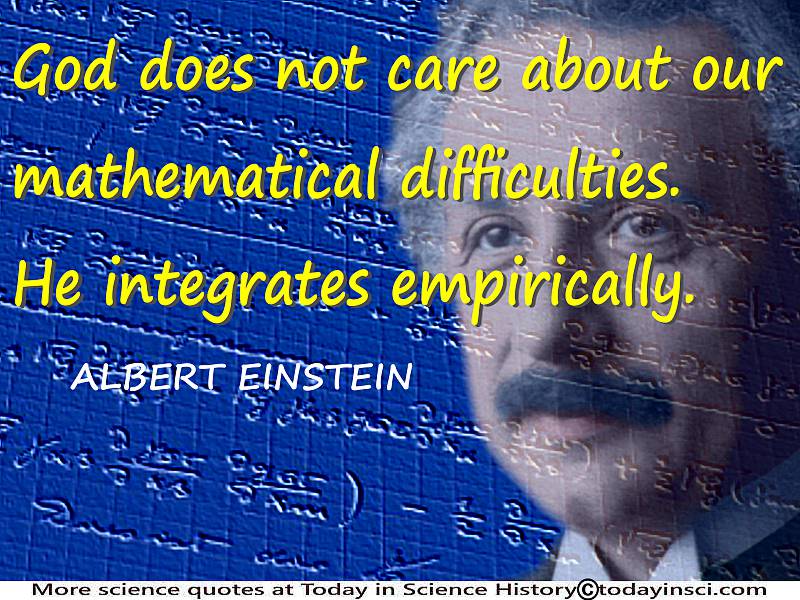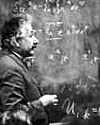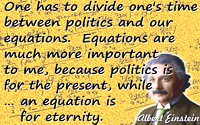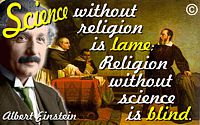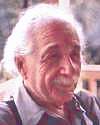 (source)
(source)
|
Albert Einstein
(14 Mar 1879 - 18 Apr 1955)
German-American physicist who developed the special and general theories of relativity. He was awarded the 1921 Nobel Prize for Physics for his explanation of the photoelectric effect.
|
Albert Einstein Quote
“God Integrates Empirically”
Illustrated Quote - Large (800 x 600 px)
More Albert Einstein quotes on science >>
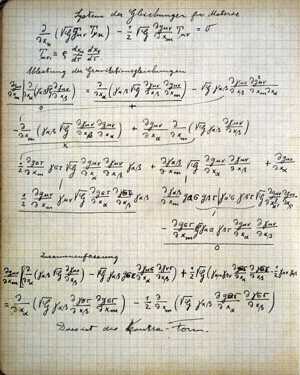
Page from Einstein's Zurich notebook, showing summary of the derivation of gravitational field equations of unknown covariance that are not derived from the Riemann tensor (source)
The Context of Albert Einstein's “God Integrates Empirically” Quote

Several sources of this quotation cite it as originating in an autobiographical book by Leopold Infeld, who introduces the quote as “one of Einstein's beautiful phrasings.”1 Infeld was assistant to, and then a scientific collaborator with Albert Einstein (at the Institute for Advanced Study, Princeton, New Jersey), so he is presumably able to provide such a quote from first-hand experience.
One of the problems on which they worked together was Einstein's theory of general relativity. They sought to reconcile equations of the gravitational field with equations of motion. (What does that all mean? Don't ask. Just know there are elusive, complex calculations involved.) At the same time, they wanted “to pay any price in computation to obtain a theory which is cleaner and purer from the logical point of view.
Part of the complexity of the equations involved finding solutions to partial differential equations, and to compare those mathematical results with what can be physically observed. The mathematical technique that must be applied is called “integration.” An empirical approach begins with evidence derived from observable experience rather than logic from first principles.
Einstein and Infeld worked with the mathematics, and Infeld says, “When we had toiled for months over problems of this character, Einstein used to remark:
‘God does not care about our mathematical difficulties; He integrates empirically.’”
This shows Einstein's belief, as expressed in Infeld's words, that
Hence, your Webmaster interprets Einstein's remark to mean that “Nature does its own thing, needing no mathematical blueprints, but whatever is, that's just the way it is, and Nature continues to proceed that way.” Scientists want to make a mathematical blueprint that predicts that behavior, because then that can be used to provide more insight into related phenomena.
Thus, any child knows that to stand, holding a heavy rock over its foot and let go, results very promptly in a painful foot. Nature releases (what scientists call) the energy in the gravitational field, and turns it into motion as the rock and the Earth gravitationally attract each other. Which turns out badly for the foot, since all that energy is released by the rock when they meet.
While the child limps away, the scientist is still trying to figure out HOW does gravity actually DO that? Because the same gravity also influences the motions of the stars and planets, at vast distances apart. And the frustrated scientist wants to know not just “how,” but also to have the ability to make the kind of predictions with which measurements agree on “how much.” Furthermore, that gravity originates from the assembly of atoms into a mass. How does gravity relate to the laws governing the inside of the atom?
These are the mathematical difficulties that perplexed Einstein.
- Science Quotes by Albert Einstein.
- 14 Mar - short biography, births, deaths and events on date of Einstein's birth.
- Albert Einstein - My Theory - The Times (1919).
- Geometry and Experience - Address by Albert Einstein to the Prussian Academy of Sciences (27 Jan 1921).
- Even Einstein's Little Universe Is Big Enough - New York Times article (2 Feb 1921).
- Large color picture of Albert Einstein (850 x 1000 px).
- Albert Einstein - Context of “God … integrates empirically” quote - Medium image (500 x 350 px)
- Albert Einstein - Context of “Laws of mathematics refer to reality” quote
- Albert Einstein - Context of “Laws of mathematics refer to reality” quote - with Large image (800 x 600 px).
- Albert Einstein - context of quote Mathematics…a product of human thought - Medium image (500 x 350 px)
- Albert Einstein - context of quote Mathematics…a product of human thought - Large image (800 x 600 px)
- Albert Einstein - context of quote “Politics is more difficult than physics” - Medium image (500 x 350 px)
- Albert Einstein - context of quote “Politics is more difficult than physics” - Large image (800 x 600 px)
- Albert Einstein - context of quote “Science without religion is lame; religion without science is blind.” - Medium image (500 x 350 px)
- Albert Einstein - context of quote “Science without religion is lame; religion without science is blind.” - Large image (800 x 600 px)
- Albert Einstein - context of quote The Lord God is subtle - Medium image (500 x 350 px)
- Albert Einstein - context of quote The Lord God is subtle - Large image (800 x 600 px)
- Albert Einstein - context of quote Imagination is more important than knowledge - Medium image (500 x 350 px)
- Albert Einstein - context of quote Imagination is more important than knowledge - Large image (800 x 600 px)
- Albert Einstein - context of quote A theory can be proved by experiment - Medium image (500 x 350 px)
- Albert Einstein - context of quote A theory can be proved by experiment - Large image (800 x 600 px)
- Albert Einstein - context of quote Falling in love is not at all the most stupid thing - Medium image (500 x 350 px)
- Albert Einstein - context of quote Falling in love is not at all the most stupid thing - Large image (800 x 600 px)
- Albert Einstein - context of quote That is relativity - Medium image (500 x 350 px)
- Albert Einstein - context of quote That is relativity - Large image (800 x 600 px)
- Albert Einstein - context of quote “One thing I have learned in a long life” - Medium image (500 x 350 px)
- Albert Einstein - context of quote One thing I have learned in a long life - Large image (800 x 600 px)
- Albert Einstein - context of quote “Why is the electron negative?” - Medium image (500 x 350 px)
- Albert Einstein - context of quote “Why is the electron negative?” - Large image (800 x 600 px)
- Albert Einstein - context of quote “The formulation of a problem is often far more essential than its solution” - Medium image (500 x 350 px)
- Albert Einstein - context of quote “The formulation of a problem is often far more essential than its solution” - Large image (800 x 600 px)
- Albert Einstein - context of quote “Our exalted technological progress” - Medium image (500 x 350 px)
- Albert Einstein - context of quote “Our exalted technological progress” - Large image (800 x 600 px)
- Albert Einstein - context of quote “There exists a passion for comprehension” - Medium image (500 x 350 px)
- Albert Einstein - context of quote “There exists a passion for comprehension” - Large image (800 x 600 px)
- Albert Einstein - context of quote “An equation is for eternity” - Medium image (500 x 350 px)
- Albert Einstein - context of quote “An equation is for eternity” - Large image (800 x 600 px)
- Subtle Is the Lord: The Science and the Life of Albert Einstein, by Abraham Pais. - book suggestion.
- Booklist for Albert Einstein.
